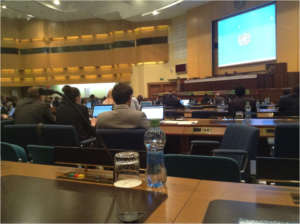2016: ON THE PREMISE OF CHANGE
Happy New Year!!! Welcome to 2016; as we slowly and sadly leave the holidays [which I enjoyed, hope you did] and kick-start the year let’s look at what trends are expected to shape Nigeria socio-economically as many people expect the “change” mantra of the Buhari’s administration to enter full gear.
January kicks off with a 50 kobo [N0:50K] decrease in the pump price of petrol, making the black gold retail at the price of N86:50k for Africa’s most populous nation, a change that many Nigerians feel has no major effect and a change many petrol stations are not complying to.
Budget: The 2016 federal budget was presented before a joint session of the National Assembly last year which was proposed at N6.08 trillion, and was dubbed a non-oil budget as only 13% of the budget outlay is expected to come from oil.
The situation could get harder than envisaged as the International Monetary Fund [IMF] has said that crude oil prices may slump to as low as $20 per barrel in 2016.
With Nigeria expected to produce 2.2 million barrels of crude oil per day in 2016 and sell at $38 per barrel, the country expects to generate $83.6 million per day in 2016 – $30.514 billion in the year 2016.
Going by IMF’s predictions at $20, Nigeria would generate $44 million per day in 2016, amounting to $16.060 billion in the year.
This would mean that Nigeria would get at least 47.4 percent less revenue from oil than what is already projected
The debate in past years has always been how close the benchmark should be to the price of crude. Excess crude account was created in the good old years to warehouse the difference between benchmark and actual price. This is no longer the case as Government now has to plan with expectation that actual crude price will rise back to benchmark.
Perhaps, balancing the exchange rate amy help cushion the effect. Official exchange rate is currently N197 to a Dollar.
Security: The deadline given to the Army by President Buhari for the insurgency in most of the North East passed and it was celebrated that victory had been accomplish; hopefully it would be the roadmap to a peaceful year in terms of security save a little hiccups here and there.
With faith lost by the populace in the Nigerian Police Force, we can only hope that hope is rekindled in 2016 as the police are first responders to issues of domestic insecurity and violence.
Justice: Moving on, the performance of Buhari’s administration would be a topic for every occasion as issues surrounding Supreme Court verdicts for Akwa Ibom, Rivers and Taraba states governorship elections being expected in the first quarter of this year, it is envisaged that whatever becomes the outcome would alter the political configuration of the affected states. Not to forget the legal confusion in Kogi State after the demise of late Prince Abubakar Audu who was the running candidate of the ruling APC party.
Corruption: The President’s stance on corruption is also going to be tested given his commitment to stamp the menace and the general that he is a “no-nonsense” person.
Issues like “Dasukigate”, the scandal facing the former National Security Adviser Lieutenant Colonel Sambo Dasuki (rtd) and others over the embezzlement of 2.2 billion Dollars, the Hyde Park Lane saga facing former Minster of Petroleum, Diezani Allison-Maduekwe and many more cases that Nigerians are itching to hear.
It is interesting to note that more than just hearing about the gazillions that are looted from the nation’s purse, citizens are clamouring for stringent convictions.
Unemployment: Finally, N5,000 stipends to be paid to unemployed youth as promised during the campaign of Mr. President and the growing state of idle youth. A policy that many analysts view as one that said in the heat of the moment.
Concerns are centred around how feasible is the policy and what baseline data would be used to assess the number of unemployed youth [for a nation that has 70% of its population leaving below the poverty line]
With the harmattan in full swing, it’s never been a better time to put on your shades, buy some popcorn and watch the drama unfold daily. Happy New Year & God Bless Nigeria.










